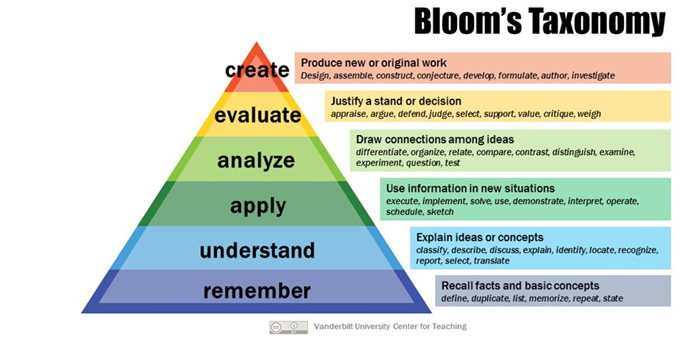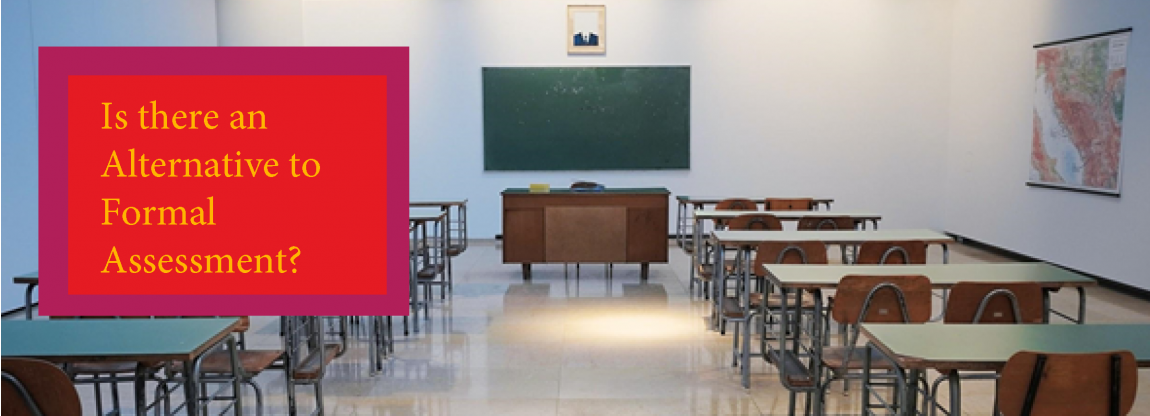Is there an alternative to formal assessment?
Higher education courses are typically designed around high-stakes, high-pressure assessments. Every semester, students across post-secondary institutions traditionally sit in drafty exam halls and mentally prepare themselves to take the tests that will ultimately decide their futures. Today, everything hangs in the balance - and it’s all down to the COVID-19 crisis.
In the midst of this global pandemic, education and assessment have moved online and institutions around the world are having to re-think their formal assessment models. This has led educators to take a step-back and examine more creative alternatives for measuring learning outcomes and success - which, if done correctly, can often be more effective, inclusive, and beneficial for students.
Let’s take a look at how instructors can re-evaluate traditional assessment methods and prepare their students for the world ahead.
The formal assessment model
Summative assessments measure student learning and academic success at the end of a semester or course. In higher education, students are typically assessed during final exams. And more often than not, these exams either follow a multiple-choice format, are essay-based, or use assessment methods that rely heavily on memorisation. While these formal assessments are easy to standardise, they can encourage “teaching to the test”, which doesn’t always prepare students for the real world.
What’s more, depending on the subject matter, these formal assessment methods aren’t always the best indicator of whether students have actually achieved their learning goals. A student’s exam performance may suffer due to nerves or feeling under pressure. And according to Bloom's Taxonomy, memorisation is actually the lowest form of learning; it doesn’t require the students to develop and display their critical thinking, problem solving, or creative skills.
Indiana University has put together an excellent table that compares typical testing to more authentic alternatives. It’s based on knowledge from Grant Wiggins, who was an expert on assessment reform, and states that a typical standardised test:
- Demands a correct answer
- Includes questions unknown to the students in order to be valid
- Isn’t connected to real-world contexts
- Isolates skills
- Provides one opportunity for students to show-off their knowledge
- Gives a score
Formal assessments clearly have a place in education, but while we’re living through uncertain times, it is worth exploring alternative options for the upcoming semesters when meeting for exams in-person may not be a safe option.
What are the alternatives to formal assessment?
Assessments should not only provide students with a standard grade, but also push them to use their skills in a variety of complex ways. Students should be required to think critically and demonstrate the 21-century skills they will need in their professional lives.


Exams should test more than just memorisation, encouraging students to demonstrate greater understanding - as illustrated in Bloom’s Revised Taxonomy.
Below we’ll share with you a few ideas (and tools) for student assessment. These will all help you to creatively measure student learning outcomes.
Focus on formative assessment instead
You might consider designing a course around a series of integrated tasks that lead up to a larger final product, rather than putting most of the focus on an end of year exam.
These coursework tasks for English or humanities subjects, for example, could include a thesis idea, an outline, a first draft edited by a peer, a final essay, and ultimately, an email pitching the essay to a literary journal. This provides students with real-world experience.
This approach falls under the umbrella of formative assessment, which enables instructors to modify their teaching throughout a course based on student progress. It also offers the opportunity to provide regular feedback to help students reflect on their work and focus on achieving their learning objectives.
Formative assessment comes in many different forms; it could mean analyzing scientific case studies, reflecting on simulation videos, or discussing readings as a class for participation marks throughout a semester.
These assessment types (and others) are all supported by our online course content and assessment platform Connect, which you can learn more about here.
Host presentations
You’ll probably be used to giving your students assessed presentations as part of their coursework. The current situation may seem to preclude that. However, the very same online teaching platforms you’ve been using to deliver classes can also offer you the option to assign assessed presentation work to your students.
As a final project, you may ask students to give presentations individually or in groups via an online video conference. Depending on the course content, this might include having students argue a point, pitch a project, or simply showcase their work.
To make things really interesting it could be a great idea to invite outside industry experts to watch the presentations online from anywhere in the world - which would have been difficult or impossible to do in a normal classroom situation. They would provide their thoughts and feedback, giving students additional motivation and an excellent opportunity to make professional connections. The presentations can also be easily recorded for review and moderation later.
Assign a learning portfolio
An online learning portfolio is a place for students to visually reflect on what they’ve learned and achieved during a course, making this an excellent method for instructors to draw conclusions about their students’ learning.
Using course portfolios, instructors might ask students to connect course concepts, map out their learning journeys, or reflect on how they’ll apply course knowledge in the future. Instructors teaching arts, design, media or architecture might instead assign students a professional portfolio, which displays their best work, the skills they’ve learned throughout the semester, and teaches them the skills they’ll need to have in order to showcase their work in their future careers.
Loyola University has some excellent resources for instructors interested in incorporating learning portfolios into their courses, including tutorials and examples, which you can check out here.
Challenge students with simulations
Designing role-play simulations is a great way to assess student knowledge in action. Not only do they challenge students on a cognitive level, but simulations also push them to perform under pressure and put their skills to use.
The best part is, they work to assess students in any field of study. Instructors might have business students simulate a pitch meeting between a startup founder and investor, for example. On the other hand, human resources instructors might ask students to simulate a tough conversation between an employee and a human resources manager.
It’s important for instructors to provide a rubric to students after the assessment, which will help pupils understand their strengths and pinpoint what they need to improve. It may also be a good idea to assign a simulation both at the beginning and end of the semester, helping students to reflect on just how much they’ve learned throughout a course.
Developing academically rigorous simulations have been a core part of our product development, and we’re pleased to offer a whole set of simulations in core disciplines available within our higher education platform Connect.
Run online exams
For instructors that still rely on summative exams, there is an opportunity to hold them online. And with the right innovative tools, the tests can certainly be secure - as well as provide students with adequate exam conditions.
Our education platform Connect, for example, offers instructors features to uphold exam security - such as the ability to record students while they’re taking exams or midterms. In fall 2020, the platform will also include remote proctoring, browser locking and student identity verification features through the remote monitoring platform Proctorio, to ensure all students are taking their tests with integrity.
How are you planning to re-think your assessment model in the semesters ahead? Don’t forget: we’re here for your assessment needs, and would love to hear from you regarding your thoughts and requirements in this area!
Learn more about our online platform Connect here.
Are you ready to discover more tools for assessment? Check out ALEKS, our artificial intelligent learning system, which uses adaptive questioning to determine student maths knowledge.
Sign up to our newsletter

